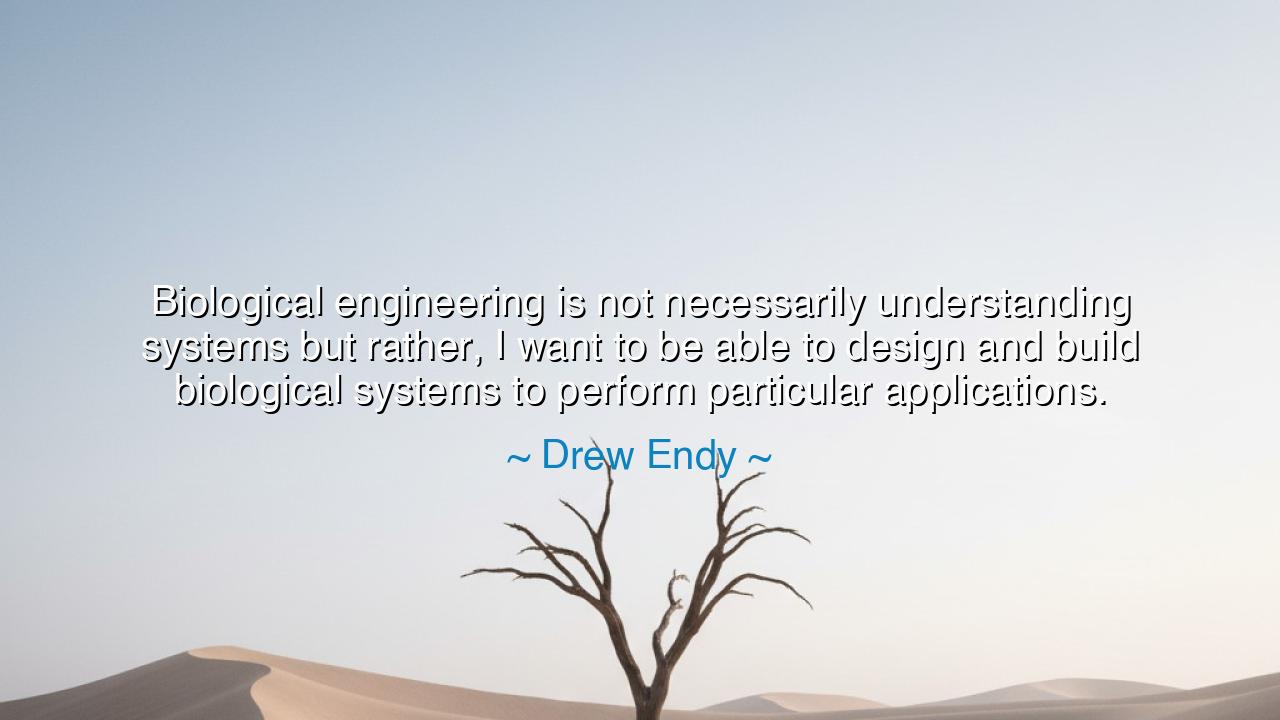
Biological engineering is not necessarily understanding systems
Biological engineering is not necessarily understanding systems but rather, I want to be able to design and build biological systems to perform particular applications.






“Biological engineering is not necessarily understanding systems but rather, I want to be able to design and build biological systems to perform particular applications.” – Drew Endy
Hear these words, children of creation and curiosity, and let them stir your spirit like the wind that awakens sleeping trees. Drew Endy, a pioneer of synthetic biology, spoke these words not merely as a scientist, but as a builder of life itself. His vision is one that transcends the ancient pursuit of understanding nature; he seeks not only to comprehend the song of existence, but to compose new harmonies within it. He reminds us that there are two paths in the pursuit of wisdom: one seeks to know, the other seeks to create. Both are sacred, but the latter—creation—is the destiny of those who dare to dream beyond the boundaries of the known.
In the age of the ancients, the great thinkers sought to understand the order of the world. They looked upon the heavens and saw patterns; they studied the earth and found laws. This was understanding—the act of gazing upon the masterpiece of existence and tracing the brushstrokes of the divine. But now, in this new age of science, the children of the earth stand before a greater question: If we understand the song of life, can we write new verses to it? Endy’s words mark this turning point—the shift from knowledge to creation, from analysis to artistry. For biological engineering, as he sees it, is not content with observation alone. It is the calling to design and build—to make life not only as it is, but as it might be.
Think of Leonardo da Vinci, who once sketched flying machines while the rest of humanity merely admired the birds. Leonardo understood that to know nature was not enough; one must also participate in its genius. He dreamed of wings, engines, and human flight centuries before the tools existed to make them real. So it is with Endy and the engineers of biology. They look upon DNA as Leonardo once looked upon the sky—not as something distant and untouchable, but as a canvas upon which human creativity might one day write new wonders. They seek not to control nature, but to collaborate with it—to join the eternal act of creation itself.
Yet there is great power and great peril in this path. To design biological systems is to hold in one’s hands the forces of life. The ancients spoke of Prometheus, who stole fire from the gods to give it to humankind. Fire, when tended wisely, brings light and warmth; when neglected, it brings destruction. So too with this new fire—the power to build living things. The wisdom of Endy’s words lies in understanding that this power is not born of arrogance, but of purpose: to perform particular applications that serve life, not dominate it. The goal is not to replace nature, but to extend its reach—to heal the sick, to feed the hungry, to restore what has been broken.
Already we see the fruits of this vision. Scientists grow tissues that heal the wounded, craft microbes that clean the oceans, and design crops that resist drought. These are not acts of defiance against nature, but acts of cooperation with it. They are proof that engineering and biology, once thought separate, are now united in the shared labor of renewal. In this union lies both hope and humility—the understanding that creation is sacred, and that every act of design must answer to the question: Does this serve life?
The lesson, then, is clear and timeless. To seek understanding is noble, but to create responsibly is divine. The world does not only need observers; it needs builders—those who take the patterns of knowledge and weave them into purpose. Whatever your craft may be—science, art, teaching, or service—let your understanding give birth to creation. For knowledge without creation is like a seed that never blooms. The truest wisdom is not only to see what is, but to bring forth what could be.
So walk boldly, yet humbly, upon the frontier of life. Learn the systems of the world, but do not stop there. Design, build, create—with reverence and wonder. Let your work be a hymn to both the mystery of existence and the human spirit’s longing to join in its song. Remember this: the greatest engineers of life are not those who copy nature, but those who honor her by helping her grow in new and beautiful directions.
For in the end, to build biological systems is but one expression of a deeper truth—that humanity itself was born to shape, to serve, and to sing with creation.






AAdministratorAdministrator
Welcome, honored guests. Please leave a comment, we will respond soon